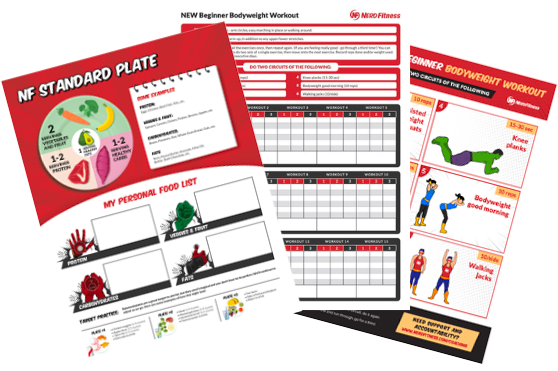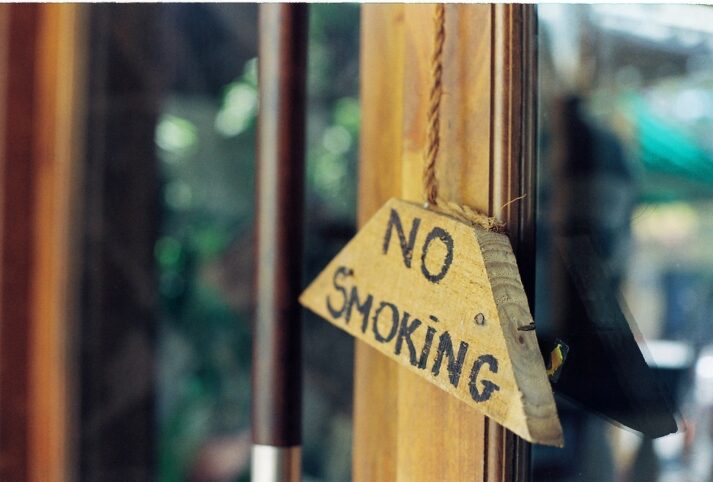
This is an article from Team NF member Staci Ardison
Two thousand, two hundred and fifteen days.
That’s 316 weeks. 72 months. More than 6 years.
What’s the significance of these numbers?
This is how long, as of the time of my writing this, that it has been since I have smoked a cigarette.
We spend a lot of time talking about diet and exercise here on Nerd Fitness, but if you’re a smoker, quitting smoking is the best thing that you can do to level up your fitness.
Walking out of the gym and lighting up a cigarette (which I did more times than I’d like to admit) is definitely the opposite of the “post workout” recovery we are going for!
Now, I know what you’re saying: “Oh, please, not another boring article telling me the same things about how smoking is bad for me and that I should stop.”
I’m not going to do that to you.
It’s not a secret that smoking is bad for you. The box is littered with warnings and it’s not a disputed fact that smoking causes a magnitude of health problems, including 90% of all lung cancer. It’s also not a disputed fact that it’s expensive and that it makes everything around you reek.
I could write an article all about all of the negatives of smoking, and it would only cover the very tip of the iceberg. And I wouldn’t be teaching you anything new.
So if there are so many negatives about smoking, we are all very well informed about them, and we all know that we should quit, why don’t we?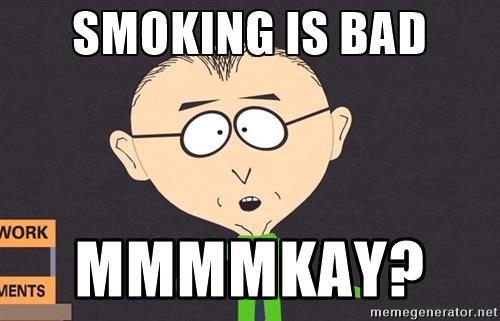
Why did I chain smoke for years, even though I knew better?
That’s what I’m going to talk about today.
The majority of smokers don’t actually WANT to be smokers, have tried to quit, and have failed multiple times. It’s not easy, and what a lot of people don’t realize is that being a smoker isn’t as much of a choice as we think.
Today, we’ve got a big time post for you: The Ultimate Guide to Quitting Smoking.
We’re going to go into why you’re struggling with quitting, and how to put steps in place to help you stop for good. Like everything at Nerd Fitness, this isn’t a prescription, but rather “this is what has worked for me, for many members of our community, and we’re here to help you if you want to try.”
Note: This is not medical advice, but you knew that, right? These below are suggestions on how to quit smoking from someone who has gone through it and wants to help. If you are quitting smoking and have any medical concerns, or experience extreme depression, please contact your doctor ASAP.
My Story

I have a lot of experience in quitting smoking. In the twelve years I smoked (on average about a pack a day), I tried hundreds of different ways to quit, and was never successful for more than a few weeks at a time until I finally found the proper mixture of the solutions.
It’s now been over six years since my last cigarette, and I have no doubts that I’ll never have one again. And it’s not that I don’t struggle, think about them, or want them. In fact, while I was working on this article, my brain was thinking so much about cigarettes that I started having intense cravings and dreams urging me to start smoking again.
My brain still tries to look back at my time smoking fondly, and the psychological impact has still yet to completely go away, and I’m not sure that it ever will.
Like many others, I started smoking as a teenager (sorry, Mom!). I’d like to say that the media made me do it, that I smoked because my favorite celebrities or video game characters smoked, or that it was because everyone in my family smoked.
But the truth is, I smoked my first cigarette because I was curious. I simply wanted to know what it was like. I knew it was bad for me, all of the health risks, that it was expensive, disgusting, and that I didn’t want to do it long term.
I thought I could simply smoke one, see what it was all about, and never do it again.
I was wrong.
I loved it, and was hooked. But at the same time, as much as I loved it, it feels like as soon as I started, I was also already trying to quit.
Before I was 18 I tried asking my friends to not buy them for me and I still managed to get my hands on them, but at least had to ration them. After I turned 18 and could legally buy them, the struggle really began. I tried patches, pills, creams, gums, hypnosis. You name it, if they created it, I had tried it.
I wanted to quit so badly.
I missed a ton of school my freshman year of college due to an ulcer in my throat (which held me back a semester because I couldn’t sing and I was a music major), got hospitalized for pneumonia multiple times, mourned an Aunt who passed from lung cancer, and yet I still kept smoking. No matter how sick it made me, how poor it made me (an online calculator estimates I spent about $22,000 on cigarettes), how many loved ones I lost, I just. Couldn’t. Stop.
But finally, after smoking (and trying to stop) for twelve years, I finally quit, for good.
Quitting smoking is, hands down, one of the hardest things I’ve ever done in my entire life. Like Bart Simpson:
https://www.youtube.com/watch?v=q8AULZ2le28
In fact, whenever I’m really struggling with something, I remind myself of the struggle of quitting smoking, and that I won that battle, and that if I could win that battle, I can do anything.
My goal today is to teach you everything I learned in my twelve years of trying to quit smoking, what to expect while you’re quitting, and what to do when you fail – because you probably will – and know that it’s not only normal, but just a part of the process and shouldn’t be something that gets you down.
The Science of Cigarette Addiction
 While we think of it as a choice to smoke, the truth is, for the majority of smokers, it’s not a choice.
While we think of it as a choice to smoke, the truth is, for the majority of smokers, it’s not a choice.
If it was a simple choice, we just wouldn’t do it! Now, I know what you’re thinking: a smoker chooses to purchase cigarettes, to open the pack, put the cigarette to their mouth, light it, and inhale.
While this is all true, nicotine is a drug, and not only that, it’s a highly addictive one. Even if you enjoy smoking, whether you realize it or not, you’re likely addicted (90% of people), and your brain convinces you that you need to smoke. In the simplest terms, what happens is that your brain actually believes that it needs the substance you are addicted to (in this case, nicotine) to survive.
No one wants to think of themselves as a drug addict, but if you’re a smoker, you are addicted to a drug, and accepting this and understanding a bit about how the addiction works can help you understand what your mind is doing during the quitting process, and knowing is half the battle.

Once you take a puff of a cigarette, nicotine heads straight to your brain (arriving in ~10 seconds), where it raises the levels of dopamine in your brain, producing feelings of pleasure and reward. This not only makes you feel happy and relaxed, but reinforces the feeling that smoking is a desired and pleasurable experience.
It also causes the release of adrenaline, which increases the heart rate and blood pressure. In addition to nicotine, there are hundreds of different chemicals within cigarettes, many of which have their own addictive properties.
Nicotine has a very short half life of only 1 to 2 hours, which means that it wears off very quickly. About 30 minutes after your last cigarette, nicotine levels will have halved, and your cravings will start again.
Over time, as you smoke more, your brain starts to change and you create more receptors to accommodate the nicotine coming to the brain. With time, your brain will want more and more nicotine to fill those receptors. Once you quit, your brain still expects the nicotine to fill those receptors – one of the reasons why the cravings continue even after the nicotine is “out of your system” (source):
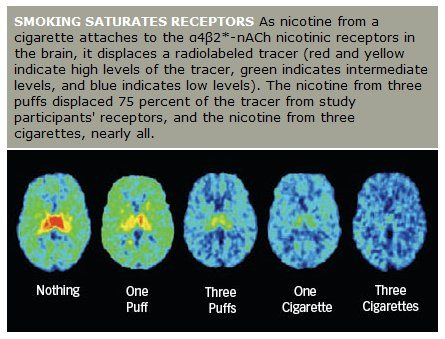
Once your nicotine cravings start, the withdrawal symptoms come: anger, anxiety, depression, irritability, impatience, trouble sleeping, and restlessness. The easy cure for these symptoms is, of course, more nicotine, which will ease the symptoms making you feel good but also release more dopamine, rewarding yourself for smoking that cigarette.
This creates a cycle in your brain making you believe that you need the nicotine to make you feel good again.
That’s right…

So many of the positive experiences that you believe are created by smoking a cigarette – such as feeling less anxious – are actually just the nicotine curing the symptoms of withdrawal. The nicotine withdrawal was creating the anxiety in the first place. Feeling restless and needing a cigarette to concentrate? You could be restless and having troubles concentrating in the first place because your brain wants a cigarette.
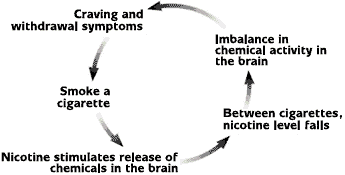
The majority of the time, the stress and anxiety you are trying to cure by smoking is actually caused by the addiction itself, and you wouldn’t feel it in the first place if you did not smoke.
It’s a poisonous circle, and it is a chemical dependency – much like alcoholism or any other drug addiction – and it’s why it is so difficult to quit.
The good news is, you don’t NEED to smoke, and you can break your addiction.
Next, I want to dig into the various types of “quit smoking” aids that you see advertised everywhere, before digging into our favorite method here at Nerd Fitness, and the one I used to break my addiction.
What you need to know about Patches, Pills, and Gum
First, there are multiple methods of quitting using aids like patches or gum.
Each method alone has, depending on where you look, on average under a 5% long term success rate. Many of the higher success rates you see are listed after a month or three months, and reduce greatly if you look out a year. Remember when looking at products and their success rates that they are trying to sell you something, and therefore want to make their product look the most successful.
Here is the big issue that many people might have with these methods: There is a lot more that goes into quitting smoking than the nicotine addiction. There are also habits, psychological elements, and chemical addictions. While some of these methods may make the cravings less intense, you still need to treat the other elements as well.
Nicotine Replacement Therapy (NRT): This is nicotine in patch, pill, or ecigarette form. You still are getting nicotine; the amount is slowly reduced over time, and since you’re not smoking, you can reduce the habit and chemical dependencies. Studies have shown that NRT can help increase your chances of quitting, however every study I’ve seen includes a note that the effectiveness of NRT appears to be dependent on the other methods the user is also using.
Prescription medicines: These have the highest success rates at about 7%. The most popular versions of this work by targeting the receptors in your brain or by inhibiting the re-uptake of dopamine. You need to get these from your doctor. If you want to go this route, make an appointment with your primary care physician and take your smoking log (we’ll talk about that below) with you. This will not only be helpful information for your doctor, but will show them that you’re serious about wanting to quit.
I personally tried every method except for medicine. The patch gave me super vivid nightmares, which some people enjoy, but I couldn’t handle.
If you think you need an additional piece of support to wean off the nicotine, there’s nothing wrong with that. I ended up quitting using the rest of the methods here, without the use of any sort of NRT, but it could be helpful if you are really struggling.
What about E-Cigarettes?

One method of helping assist people quit that’s gaining popularity fast is the e-cigarette or vaping.
The e-cigarette is an electronic vaporizer which uses a liquid version of nicotine that you smoke. They are a relatively new product to the market (within the last 10 years in the United States) and have been the subject of numerous discussions, lawsuits, and political arguments (here’s a detailed history, if you’re interested).
It’s too soon for studies on long term health effects, but short term, the general consensus is that while they may less dangerous than smoking a traditional cigarette, they still contain nicotine, can contain a slew of chemicals (pdf), are still highly addictive, and don’t really count a healthy alternative.
Basically, they’re kind of like a “paleo cookie.” Compared to a traditional cookie, it contains slightly fewer unhealthy ingredients; however, just because it’s marketed as an alternative doesn’t mean it’s “healthy.”
I’ve had a lot of people tell me that they have succeeded in quitting smoking using e-cigarettes, mainly because you can reduce the overall amount of nicotine while still “smoking.” You can purchase different nicotine levels which allows you to get less nicotine each time you smoke (kind of like smoking half of a traditional cigarette instead of a full one). This way, they were able to slowly reduce the nicotine addiction, and then break the habits associated with smoking.
Now, statistically studies show about a 1-2% increase in short term success over the nicotine patch, and about a 3-4% increase in success rates over nicotine gum (depending on the study, the rates are about 7, 5, and 4.1%, respectively). Longer term (over 6 months), however, rates flatten out and end up being about the same as the patch, and some people just switch completely to e-cigarettes and then never quit.
Remember that with this method, you still need to reduce the nicotine levels over time, break the nicotine addiction and change your habits.
Okay! Regardless of whether you choose to implement one of the above aids, we are going to help you address the root cause of your addiction and then move onto solutions to breaking free.
Breaking The Addiction the Nerd Fitness Way

I’m not going to tell you to go around the house and break all of your cigarettes in half and flush them down the toilet.
Quitting smoking is a process, and while I’d love for it to be something that people can just put down and never pick up again, for the majority of us, that’s just not how it works.
The first thing we’re going to do is start planning, and this is just as important as the actual quitting stage, so don’t rush it!
FIRST, WHY DO YOU SMOKE?
Do you enjoy it? What reasons do you have to continue smoking? What objections come up when you think about quitting? Think about these reasons. Write down a potential list of reasons why you still smoke. Here are some common examples:
- You enjoy the “buzz.”
- You’re stressed out/you have anxiety and it helps you relax.
- All of your friends smoke, and you’ll lose your friends.
- If you don’t smoke, you won’t get a break at work.
- You’ll lose your significant other because you get moody without cigarettes.
- You’re not strong enough to quit and you lack the willpower.
- You have too many other things going on and you can’t handle the stress of quitting.
Now, look deeply at each of the reasons you came up with. Many of these reasons are likely based on one of two things: addiction or fear.
It helps you relax (addiction); you’re afraid of the changes that will happen in your life you don’t smoke (fear); afraid of not being in the right crowd by quitting (fear); think that you’re not strong enough (fear).
Now, fear is actually just a part of the addiction – your brain is afraid that you’re actually serious about this and are going to try to deprive it of its nicotine. Even though one part of your brain knows you should quit, another part of your brain wants you to keep smoking, so it is going to create every barrier that it can.
I want you to truly think about the reasons that you continue to smoke, why it’s a valid reason, and a counter point to it. Here’s mine:
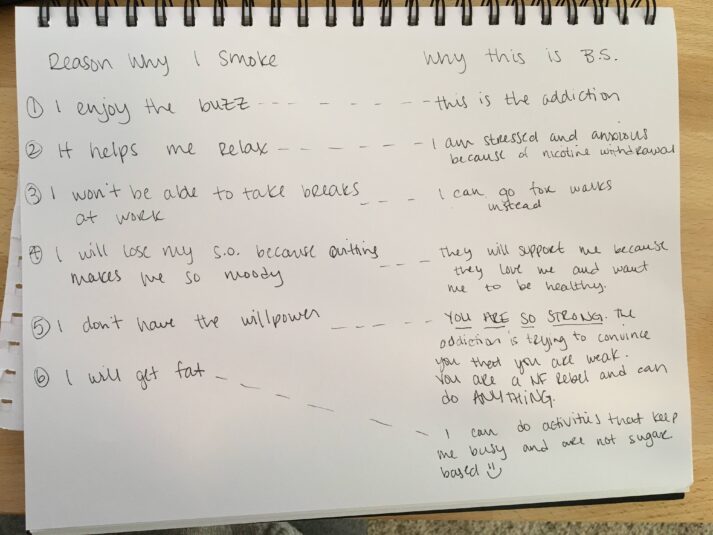
Understanding the reasons why you continue to smoke, that they are the addiction speaking, accepting that you have an addiction, and that you are afraid to quit are big steps to move towards being able to quit, and the first step you need to take to be able to dispel your concerns and fears about quitting. It’s much easier to go up to bat against the games your mind is going to try to play with you if you understand that they are just games and part of the addiction.
FIGURE OUT DEEP DOWN WHY YOU WANT TO QUIT
You might say, “Why? I want to quit because it’s bad for me and because it’s expensive, duh.”
Now, while health and cost are great reasons to want to quit, it’s helpful to think deeper down. Keep asking why. We all knew it was something that could kill us and drain our bank accounts when we started, yet we tried anyway.
About ten years ago, I went to visit my Great Aunt in a nursing home, where she was dying from lung cancer caused by smoking, and lit up a cigarette on the way home. I believed that I would stop “before that happens to me,” even though my grandfather also died of lung cancer when he was 44. Sound familiar?
One Nerd Fitness Rebel told me that they quit smoking because it was too expensive. They got paid and could afford food for their children OR their cigarettes, so they quit smoking. The truth is that they didn’t quit because it was too expensive; they quit because the desire to feed their children outweighed their desire to smoke. If they had the money for both, they would have continued to smoke.
So this is what I mean by figuring out the deep down “why” you want to quit. If your WHY is flimsy, you’ll give up the first time things get tough. You need a DAMN good why.
Truly wanting to quit, or wanting your “why” more than you want to smoke, will be the backbone of your journey. So really think about it. You can have multiple whys, but make them specific, and use language like “I will” and “I need to,” and not “I should.” (poem by Shel Silverstein):
Write down your whys and put it somewhere you see it often as a reminder why quitting is important to you. If you think this could be helpful – paste that big why everywhere you go. One great example would be to put a picture of your child in the cigarette box, so you have to look at it every time you go to get a cigarette.
Change Your Mindset
The next step is to change your mindset about “giving up” smoking.
We talked a bit earlier about how when you smoke a cigarette, it releases dopamine in your brain, which is setting off a reward center in your brain and reinforcing the idea that smoking is something that is pleasurable. We need to start fighting that.
Stop thinking about what you’re going to be giving up, and start thinking about all that you’re gaining by quitting. You are freeing yourself from a life of enslavement to your cigarettes.
Here’s an excerpt that I really like from “My Cigarette, My Friend” by Joel Spitzer:
“He controls you totally. When he says jump, you jump. Sometimes in the middle of a blizzard or storm, he wants you to come to the store and pick him up. You would give your spouse hell if he or she did that to you all the time, but you can’t argue with your friend. Sometimes, when you are out at a movie or play he says he wants you to go stand in the lobby with him and miss important scenes. Since he calls all the shots in your life, you go.”
Think about how much extra time and freedom you would have if you didn’t smoke.
Think about how quickly you would have the money for a new Nintendo Switch. Think about all of the health benefits and how nice it will be to be able to see in full color again, to smell again. Think about being alive to hold your grandchildren and great-grandchildren.
At the same time, think about all of the negatives of smoking and why you don’t want to be doing it. Think about how you have to stand out in the cold, in the rain. Think about the coughing fit and the black phlegm you coughed up the last time you tried to go for a run. Think about cleaning out all of the ashtrays around your house, from inside your car, from outside. Think about how desperate you felt when you couldn’t gather up enough change to buy a pack the day before payday.
In addition, remember that a cigarette is not a “reward” for anything, or something to look forward to, and it should never be treated as such. It’s simply you getting your fix. If you think of a cigarette at the end of the night as a reward for going all day without one, you will have pleasant thoughts when it comes to smoking. If you tell yourself you are “getting your fix,” it changes the way you look at it to a negative one, which is what we want.
Determine Your Triggers
Next, we need to determine what our smoking habits are and what triggers us to smoke.
Without making any other changes, start keeping track of when and where you smoke. It doesn’t need to be fancy; just make a note of it and how many cigarettes you have. You can do this using a note-taking app in your phone, in a notebook, or even just a spare piece of paper that you keep in your pocket. Include details of what you’re doing at the same time if it’s relevant. Don’t overthink it. It should look something like this:
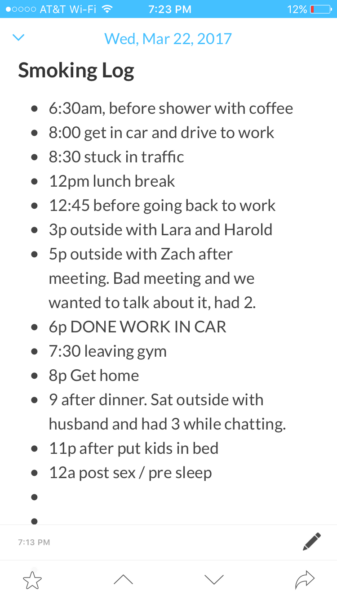
What you want to do here is look for patterns. Think about when you always smoke a cigarette:
- For many people it’s in the morning with your coffee.
- When you get in your car to drive anywhere.
- After you finish an activity (such as a meal, a meeting, class, or sex).
- When you’re drinking with friends.
It’s good to keep a journal like this over multiple types of days (workdays, weekends, vacation) so you can really establish when and where that “habit” trigger is going off. I’d suggest starting with 3 days: a work day and a weekend.
One Less, one Less…

Once you have your journal for a few days complete, you now know exactly how many cigarettes you’re smoking each day, and when and where you most want them.
The next step is determining if there are any areas where you can make an easy cut. We’re going to try to build some momentum here, by starting with the easiest place to cut back on a single cigarette. Can you smoke one less on your way to work? What about ONLY smoking one at the end of your lunch break instead of at both the beginning and the end?
Find your easy wins and start freeing yourself and building momentum.
And for this next week, just don’t have THAT one. Don’t worry about the rest – remember, we’re in this for the long haul (permanent freedom), and not worried about how quickly we can quit, only that it sticks.
I know that smoking one less for an entire week really seems like a tiny step and maybe pointless when you smoke 20 a day.
Why? We’re not trying to reduce one a week for the next decade until you don’t smoke anymore.
Instead, you’re proving to yourself with small victories that you don’t need cigarettes, that you can go without, and help build momentum to show yourself that you do have the ability to quit.
Pick A Date

When I was trying to quit, I would get physically upset and have nightmares if I picked a date, I was that attached to smoking. You don’t have to pick a date just yet, but you will need to eventually. Otherwise you will keep saying “I’ll quit tomorrow” or “I’ll quit when this pack is empty.” You’re allowed to pick tomorrow as your date, but instead of saying “I’ll quit tomorrow,” you say, “I am quitting March 29th, 2017.”
Once you do pick a date, don’t put it off, and throw away the remaining cigarettes you have. I ended up picking my date about a week beforehand.
Once you have a specific date to quit, don’t dread that day. Instead, look forward to it. It’s a freedom date. Think about how much better your life will be. Don’t dwell on anything that you think you’ll miss; those things are just your mind playing tricks on you. As soon as your mind says “Aw, man, I’m going to miss this so much,” divert it and think of the counterpoint to that argument.
Don’t wait for motivation – it’s fleeting. You’re going to have to cultivate discipline for this.
When picking a date, use timing to help you. Habit is huge when quitting smoking, so if there’s a time in the next few weeks where your habits will already be changing, use that.
When you’re looking at incorporating a bit of a shakeup in your life, such as quitting smoking, it’s oftentimes easier to do this at the same time as another big shakeup you might already have planned:
- Are you moving?
- Do you have a vacation coming up?
- Are you starting a new job?
- Did you join a new gym or start dating somebody?
Since your routines and habits aren’t set yet in a new situation (or you won’t be following them, like in the case of a vacation), it’s easier to drop bad habits at the same time. Plus, you’ll be focusing on your vacation, new job, new house, or new person, and as a result, you’ll have less time to focus on missing smoking.
While I was working on quitting, I started a new job, and I made it a hard fast rule that I was not to smoke at work.
I never mentioned to anyone that I smoked, and never took smoke breaks. Because of this, I didn’t form the habits that I had at my previous job to go out every hour to smoke, and the new friends that I made weren’t asking me to join them for that break every hour. This was a huge success for my progress towards quitting smoking. It helped me believe in myself: if I can go all day without smoking, then I could break free completely soon enough.
Now, I’m not saying you should wait until you move or until next Christmas vacation to quit – if you have nothing big coming up in the next month or two, don’t wait. Sooner is always better.
Please don’t email us saying, “I quit my job because you told me it would help me quit smoking!”
So look at your next month. Pick a date, and look forward to it.
Ask For Support

You are never alone. When you are ready, and you have your date and your WHY, it’s time to recruit your squadron.
Sit down with your friends and family and tell them that you’re going to quit, why it’s important to you, and ask for their support. If you explain why it’s so important, and tell them how they can support you, they’re more likely to take you seriously, and more likely to support you.
This includes anyone who you smoke around, or with, including your smoking friends at work. I know it may feel awkward or silly to dig deep into your feelings and talk to people you’re not super close to, but a simple sentence will suffice: “Hey, I’m quitting in 2 weeks, my son is having a baby and I’d like to be around to see it grow up. It would mean a lot to me if you could support me by not giving me shit every time I say no to going outside with you for a smoking break.”
Don’t be afraid to ask for specific help, too. If there is one day of the week that is more stressful and where your kids need to be in a million places at once and you normally smoke more, or feel more stress, see if a friend or parent can help out that day for a week or two. They would likely not only be glad to help, but knowing that others are putting in effort to help your success will help hold you accountable.
Ask your friends who smoke to tell you no if you ask to bum a cigarette, even if you pressure them and get upset.
Just like when making changes to your diet, you may see resistance, especially from friends and family members who smoke. The truth is, even if they know it’s best for you to quit, they likely don’t want to lose their “smoking buddy,” and may even feel personal guilt or shame if you succeed and they don’t.
Make sure that your friends and family understand that you’re not judging them for their decision to continue smoking just because you’ve decided to stop.
Accountability: Recruit Friends or a Squad

Adding an accountibilibuddy or squad/team to your efforts to quit adds an entire defense level to the attack of the nicotine.
Now it’s not just up to our brains (which can deceive and rationalize us!), but we have failsafes and support and people fighting alongside us here.
Figure out what will keep you personally accountable and put that system in place. Join a support group, start a special savings account, put a support line phone number (we’ll link to resources later in the article) in your wallet so it’s easily accessible.
A few ideas on accountability:
- Give a friend $500, and for every cigarette you smoke, they donate $5 to your least favorite charity or a political candidate you despise. I bet you have one in mind!
- Tell your kids that you will put all of the money from smoking into a savings account, and if you’re successful on quitting, you guys can take a family vacation with that money.
- Since cravings pass quickly, having someone to call every time you have a craving can be key. Did you know that you can call some quit smoking hotlines every time you have a craving? (And they are free!)
- Create a lunchtime walking group with people trying to quit smoking at work.
- Attend meetings and/or counseling.
I want to give two special shout outs!
The Nerd Fitness Message Board Community: This is one of the best and most supportive communities on the internet, IMHO. I joined before I quit smoking and was afraid to post for a while about the fact that I was smoking, and when I finally admitted it, no one judged me and everyone was so helpful and supportive of my desire to quit.
The NF Facebook group about quitting smoking: I just created this for anyone reading this who is a reader of Nerd Fitness and looking for a support group. Not all of us have a great in-person support group (I didn’t!), so we’ve created this group just for any Rebel looking to quit smoking. You don’t have to be ready to quit now – but if you’re a smoker and would like to eventually quit, join us there!
Foolproof Your Batcave

While you’re working on smoking one less cigarette per day, we’re going to set up a foolproof system to help you quit, and by that I mean we’re going to “Hack our Batcave.”
This concept works whether we’re trying to quit smoking or eat better or exercise more. Because we’re so influenced by our environment, a FEW steps here, done once, can automatically influence every day after that.
Look back at that journal you made about your triggered moments and when you smoke:
- Can you see when and where you are smoking the most?
- Can you change your environment to make smoking more annoying for you?
For example, start by setting a concrete rule that you must not smoke inside your house any longer, you must go outside to smoke. You can still smoke the exact same amount as you’re smoking, the only difference is now you need to get up and go outside.
After you’re used to not smoking inside for at least a week, then I’d recommend adding “no smoking in the car” rule. This way, if you want to smoke, you need to do so outside, before you get in the car, or after you get out. This means you have to leave early to get places if you want a cigarette, and if you live in colder climates, you have to stand out in the cold.
Make smoking not only an annoyance, but something you need to consciously put effort into doing, while still giving your brain what it really wants (the cigarette).
The next step is to increase barriers between you and your cigarettes, and make the cost/time commitment of smoking higher than the benefits of smoking. What’s something you could do that would make you really have to work to get a cigarette?
In short, use your laziness to your advantage. Let your environment do the work for you:
Lock your cigarettes up in a box that you keep in your car. Every time you want to smoke, you have to get up, put pants on, get your car keys, go out to your car, unlock the box, get the cigarettes, etc. Ugh, that sounds exhausting, probably easier not to smoke!
My friend once broke a TV addiction by actually putting his in the closet! It was too much work to take it out and set it up every time he wanted to watch reruns, so he just read books instead.
Do you have kids? If your reason to quit is your kids, give them the key so you have to ask them for it, or keep it in their room so you have to see all of your child’s things to get that key.
I wouldn’t let myself bring cigarettes to work, and had to decide. Do I want an extra 10 minutes of sleep, or do I want my cigarette? Which one is worth more to me today? And as time went on, the cigarette won less and less.
A quick note on smoking in secret:
Some people use smoking in secret (telling people you quit when you are really still smoking) as a final barrier between them and smoking, because if no one knows you smoke, or thinks that you quit, you have to do a lot of work to hide the smoking from everyone around you, and the cost of getting caught is definitely higher than the benefits of actually smoking the cigarette.
Now, I used this method in part by starting a new job and not telling everyone that I smoked, and when I was taking a class at nights after work, when my classmate asked if I wanted to go out and smoke on our break, I lied and told them I didn’t smoke. I did this because I didn’t want to build the habit around smoking in these places while I was planning to quit.
That type of secret smoking is pretty harmless, and can be helpful; however, telling your loved ones that you quit and then hiding cigarettes from them often has much higher implications than it’s worth, including potentially destroying your support system at home. So please think twice before you attempt to smoke in secret.
Change Your Habits
If you’ve ever tried to build a fitness habit (like drinking less soda or going to the gym consistently), you know that changing or creating one habit takes quite a bit of time and discipline.
When you’re quitting smoking, if you smoke a pack a day, you potentially have 20 different habits you need to break. It’s habit to smoke after a meal, it’s habit to smoke while driving, it’s habit to smoke when you drink coffee. That’s not one smoking habit, that’s three different habits.
For some things that include a smoking habit, we remove the cigarette from that habit (like, for example, if you habitually light up every time you get in your car).
For other things, it may be easier to change the habit altogether:
- Do you always smoke a cigarette with your coffee first thing in the morning? Start bringing your coffee with you, or having it at work, so you can’t also have a cigarette at the same time.
- Do you always smoke after a meal? Instead of going outside and smoking, go brush your teeth or go for a walk (maybe on a treadmill for a while, to prevent you from going outside, where you normally would smoke).
This is a great time to start implementing new fitness changes too. Go for a walk, do a workout, work on your mobility, do a quick yoga flow, learn how to cook a new healthy recipe and meal prep for the week. Build the habit of fitness while you’re breaking the habit of smoking.
Start making habit changes, one at a time. I recommend one per week at the fastest pace, but maybe slower if that seems too much for you. Each habit change should should remove at least one cigarette per day from your schedule.
It’s Quitting Time!
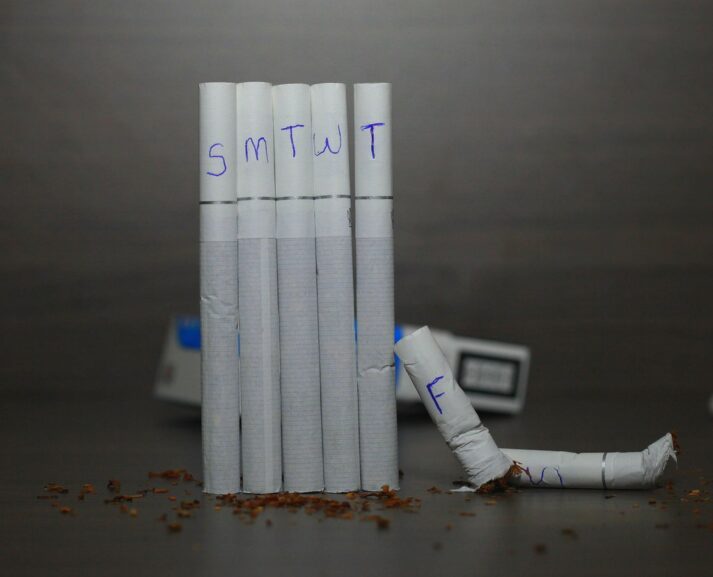
We’ve planned, we’ve started changing habits, we’ve built systems to help us, and quitting day has come.
If you followed the process above correctly, over a few weeks, you should already be smoking less than you were before, or at least be annoyed by the fact that you’re a smoker, and questioning how important it is to you.
In addition, you should be building momentum; you’re smoking less and less and building the confidence that you can, in fact, go longer and longer without a cigarette and that you won’t die without one.
And your quit date has arrived.
From here on forward, you don’t smoke. This is your new identity.
You’re not quitting, you’re not trying to quit; from now on, you’re a nonsmoker.
Quitting implies you are losing something, when in reality, you are gaining everything. Specifically, freedom.

Some people find it helpful to say that they are just choosing not to have a cigarette at this time. When my Mom quit, 20+ years ago, she always told herself she could have one again when she was 65, because after 30 years of smoking, the thought of never smoking again was too painful. She’s now 67, and still smoke free, and has no plans to smoke again.
The Withdrawal. Ruh Roh.

Your first few days will vary in terms of arghhh-ness, depending on how motivated you are, how many cigarettes you were smoking daily before you quit, etc.
It does takes at least 3-4 full days for nicotine to completely leave your system, and withdrawal symptoms will be the most intense the first two weeks. Ugh. A craving will last, on average, no more than three minutes at a time. However, when dealing with nicotine withdrawal, those three minutes will feel like forever.
The most common side effects are anxiety, irritability, dizziness, headaches, tiredness, constipation, coughing, lack of concentration, and depression. No way around it, this part is not fun.
These will go away with time, but it’s often hard to continue to not smoke when you don’t feel well and you’re depressed. They are worst the first few days, peaking at 48-72 hours. This sucks, because this is when you need to build momentum for the long run, but it’s easy to say “it’s only been a day, I’ll just have one and start again tomorrow.”
After the nicotine is out of your system, your brain still needs to repair, which will take, on average, a few weeks to a few months. The cravings will not be as intense, but will likely still be there on some level. The intensity and length of these will be dependent on how much and for how long you smoked. Every person is different.
Personally, I struggled the most on the 3’s – 3 days, 3 weeks, and 3 months. Thankfully 3 years was easy!
Cravings can start at any time for no reason: it could be associated with a memory, a ritual, or seem to be completely random. My mother called me a little while ago a bit shook up and told me that, after 20 years of not smoking, she went into a gas station and, without thinking, asked the clerk for a pack of cigarettes, followed by “…wait a minute, no, I don’t smoke!”
The reason why I started having intense cravings and dreams writing this article, is because during writing, I was thinking about nothing but smoking, and my brain was reminded of it.
Thankfully, the longer it’s been since you’ve had a cigarette, the easier it is to just shake it off and ignore it.
IN ADDITION TO THE WITHDRAWAL, YOU ARE GOING TO GET SICK.
Now, one thing to warn you about that many people don’t expect is the “Smoker’s Flu.” Yep, even though you’re doing what is the healthiest thing you could possibly do for your body, you’re likely going to have flu-like symptoms. Sore throat, tightness in the chest, overall fatigue, headaches, and constipation are just a few in addition to the coughing.
Coughing and coughing up black mucus is not only a normal part of the process, but a good thing. You might feel like you have the worst cough or flu that you’ve ever had. This can last consistently or be on and off for weeks or months.
It’s a good thing, though! Your body is starting to try to repair all of the damage that was done to it by smoking, and that is a lot of hard work.
Obviously, if the cough gets too bad, or you start coughing up blood, it is a good idea to go to the doctor and get yourself checked out.
Quick note on exercising: Intense exercise such as sprints will often make the coughing seem worse. I can’t tell you how many times I’d end up hunched over having a coughing fit at CrossFit after I quit, way more than when I was a smoker. However, it got easier and easier each time, and eventually I wasn’t coughing at all. If you’re having bad coughing fits, talk to your doctor, or stick to some lighter strength training for the first few weeks after you quit.
Withdrawal and Coping Mechanisms
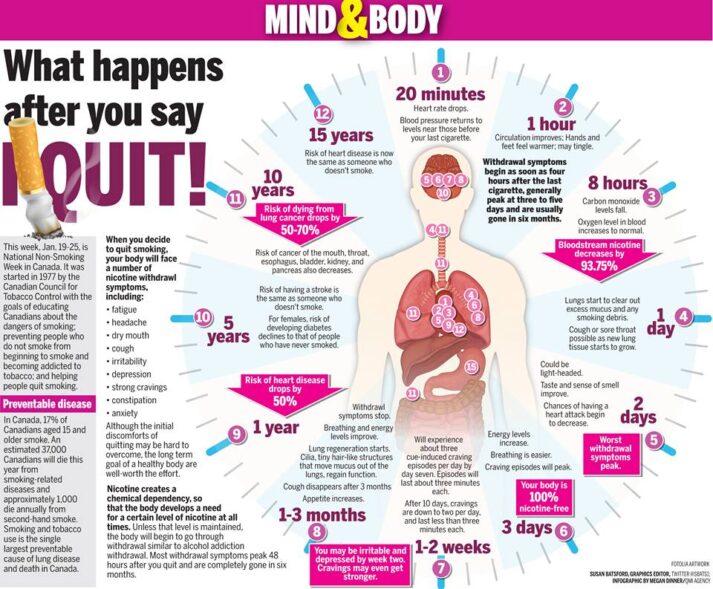
The first week or two of quitting, you may feel like you’re only thinking about smoking, and it’s probably true – your brain has created grooves and pathways where it expects smoking to fill the void and it’s wondering where it is!
Some of the withdrawal signs of nicotine are anxiety, irritability, anger, and difficulty concentrating.
1) Learning basic breathing exercises and quick meditations are invaluable here. When you feel a craving coming, or the irritability starting, stepping into the stall in the bathroom or a corner (the key is somewhere you can’t smoke. NOT outside or in your car) to meditate for a few minutes when you’re freaking out at work can not only help you quit smoking, but can be a really valuable tool for the rest of your life (I STILL step into bathroom stalls and do meditations to help combat my non-smoking related anxiety or just re-center myself during a big event).
I really like the Headspace App – they have a few “SOS” sessions that are great.
2) When with your friends or significant other, tell them you need to step away for a few minutes, and ask for them to support you. It’s not that you are angry and leaving them, it’s that you need a few minutes alone to center yourself and get over the craving.
3) Take up going for brisk walks – this is not only good for your overall health, and how we recommend you start with fitness, but coupled with breathing exercises and meditations, can help combat all of the withdrawal symptoms. Walking outside in the sun can also help with vitamin D which helps combat depression too.
4) Get up and get a glass of water and drink the entire thing – this is great for your hydration, but also gets you doing something else that lasts just about the same length as a craving, and it uses your hands and mouth, which is something you want to do when you want a cigarette.
5) Find a fun activity that keeps your mind and hands busy: I took a drawing class when I quit. Knitting, drawing, doing jigsaw puzzles, playing an instrument, even playing a new video game – get excited about something that you can not do and smoke at the same time, and can help with the fidgets.
6) Replace an activity that allows you to smoke with a new, healthy habit – start a “quitting smoking” walking group at work for lunchtime, where you all go for a walk and hold each other accountable. Go to the gym first thing in the morning, or after work. Join a local swim team or a meditation club.
7) Going to a Support Group – We talked about this in the accountability section, but having people to talk to that are not going to tempt you to give in, but who are going through the same thing as you, can help a lot. Remember: nicotine is a drug, and we need all the support we can get to get off of it.
If you don’t have one in person you can lean on, try our message boards for an online group of supportive rebels.
8) Avoid high-risk situations – For the first week or two, keeping away from high risk situations (like going out drinking with a bunch of friends who smoke) is a great idea. This is the time you’re the most vulnerable, so if you’re seriously afraid you’ll slip up, don’t go. If you’re going out with a bunch of friends and you’re afraid they will not respect your decision and pressure you into smoking, they don’t have your best interests at heart. True friends will support your decision.
Note: Your brain is going to be looking for things that release dopamine, as it’s no longer getting nicotine which did that for it. Sugar also releases dopamine, so I recommend staying away from sugar or not using sugary treats as a coping mechanism. If you do that, you’re just replacing one addiction with another, and it’s a big reason why people end up gaining weight while they are quitting smoking.
Your mind will start playing games with you and trying to convince you of how great smoking was, how much you enjoyed it, how you miss your smoking buddies, etc. Just remember that these are games and keep reminding yourself of all the things that you are gaining by not smoking anymore.
What if I slip up or backtrack?

If you have a cigarette, here’s what you SHOULDN’T do:
- Don’t feel ashamed for smoking.
- Don’t declare yourself a failure and think that you need to start all over again
- Don’t keep smoking the rest of that day.
If you slip up, and have a cigarette, do two things: first, be KIND to yourself, forgive yourself, then accept it and move on. There’s no use crying over spilled milk, right?

We’re all human and we all mess up. Forgive yourself: you are flawed, and that’s okay. So are your heroes.
You are still a nonsmoker, you just had a cigarette. The rest of the day isn’t over, so don’t say “welp might as well smoke a pack and try again tomorrow.” You never stopped trying! You hit a speedbump but kept going.
The past is the past; learn from it.

Why did you slip up? Can you learn anything from it? What can you do to prevent that from happening again?
One reason why I don’t love apps that count how many days it’s been since you have smoked is that if you have a good streak going, and you slip up and have one, it erases all of your progress. That’s not how this works. If you slip up, you’re still way ahead of where you were. You just have a data point that you can learn from.
Remember that just about everyone who has tried to quit smoking has failed. The ones who are successful are the ones who just got right back up and kept trying.
A quick note on going out drinking when you are quitting smoking:
So many people I’ve talked to say that they fail quitting smoking because they go out drinking and, when less inhibited, buy a pack and start up again. It’s true that the lack of inhibition makes it much easier to slip up while you’re drunk. Just like how diets often go by the wayside when you’re 3 pina coladas deep, you’re less likely to make great choices and instead your brain is gonna opt for pleasure, aka “crappy food” or “smoking” or “[insert whatever here].”
There are a few different methods you could follow here if this sounds like you:
- Keep to the plan and try your hardest to not smoke. Ask your friends you’re going out with for support, and put an accountability system in place. Give a friend your credit card and say the entire night is on you if you smoke a cigarette, or give a friend complete control of your money for the evening so you can’t buy a pack of cigarettes.
- Stay away from drinking for at least a few weeks, until the initial withdrawal is over and you’ve built up momentum.
- Let yourself smoke one night a week when you’re out drinking. Buy some off a friend or throw away the rest of the pack before you get home so you won’t have them the next day.
The important thing to note is that if you choose the third option, remember that’s not a forever option, just an option at first.
Helpful Resources
If you’re looking for hotlines or local support groups, there are a lot of different options. Here are a few:
1-877-44U-QUIT: National Cancer Institute Smoking Hotline
1-800-QUIT-NOW: Smokefree.gov will connect you to your state’s hotline and help you find local resources.
National Cancer Institute’s Live Chat: This is a live chat provided by the National Cancer Institute to answer any questions you have.
SMOKEFREETXT: This is a free text message program and provides 24/7 encouragement, advice, and tips to help you quit.
Smoker’s Anonymous: This used to be called Nicotine Anonymous and is a 12 step program with local meetings.
What does Success Look Like?

How do you know when you’ve been successful? In my opinion, any day without a cigarette is a success. Every time you say no, that is a success. And you should be proud every time.
If you can go one day longer each time you try to quit, that is a success. Remember, if you slip up, no judgment or shame, you don’t go back to being a “smoker.” You don’t reset your success back to zero. All of the health benefits you got from not smoking are not null and void. You are just a nonsmoker who make a quick choice and will decide IMMEDIATELY to get back on track.
You’ve escaped from a drug addiction – and should be extremely proud of that!
Feel free to throw yourself a full party each and every morning, dress up your animals in costumes, get confetti cannons, etc. In lieu of this every day, maybe try some other things:
TREAT YO’ SELF: Consider putting the money you would have spent on cigarettes in a savings account, and after a certain amount of time (3 months, 6 months, etc), use that money to take your family on a vacation or buy something you’ve really wanted but couldn’t afford otherwise.
I personally quit back when I was still doing CrossFit, and rewarded myself with a CrossFit membership. It was something I really wanted, but at $200 a month I couldn’t afford both CrossFit AND smoking, so as long as I didn’t smoke, I could keep my membership at CrossFit.
As we like to say, reward yourself with things that reward you back. Don’t reward yourself with cake or something unhealthy, but rather reward yourself with something that encourages you to continue down this new path to awesomeness.
The most important thing to do when quitting smoking is to believe in yourself, change your habits, and not stay down if you fall. Once you start to build momentum, the task that seemed completely insurmountable in the beginning won’t seem nearly as difficult.
Take your time, change your habits (be patient and don’t expect it to happen overnight!), be kind to yourself if you do fail, and just get back up. Next time, you have a higher chance at success.
PLEASE: leave your comments or questions – we’ll be continually updating this article!
If you have already quit smoking, what made you successful?
If you’re struggling with quitting, what’s the biggest hurdle holding you back?
-Staci
Image sources: Khánh Hmoong, Serial Prankster, Why have you abandoned us?, My June Calendar: The Joker’s Lair, Cyborg Mini Figure- Justice League, Animated Bat Cowl, Big Hug!, Batman vs Superman, Dracula, Ghost, Knight, 024.365 – Quit!, the end of indoor smoking
###



